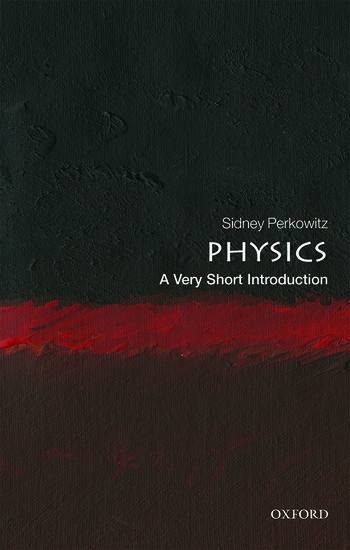Home >
A Very Short Introduction >
Physics (Science)
A Very Short Introduction | Science
Physics
ISBN: 9780198813941
Series: A Very Short Introduction
Physics (Science)
A Very Short Introduction Physics (Science) Media > Books > Non-Fiction > Education Books Expect Delays of Up to 4 Weeks| Order Below |
ISBN
9780198813941 (10-digit ISBN: 0198813945)
- Description
- Key Features
- Series Description
- Table of Contents
- Covers all areas of physics, from quantum mechanics to energy production
- Explores how experiment and theory are involved in the doing of physics, and recent results such as the discovery of gravitational waves
- Discusses the applications of physics in society, technology, and medicine
- Analyses how physics works, including who funds it, how physicists are trained, and how they think
Physics, the fundamental science of matter and energy, encompasses all levels of nature from the subatomic to the cosmic, and underlies much of the technology around us. Understanding the physics of our universe is an essential aspect of humanity's quest to understand our environment and our place within it. Doing physics enables us to explore the interaction between environment and human society, and can help us to work towards the future sustainability of the planet.
This Very Short Introduction provides an overview of how this pervasive science came to be and how it works: who funds it, how physicists are trained and how they think, and how physics supports the technology we all use. Sidney Perkowitz presents the theories and outcomes of pure and applied physics from ideas of the Greek natural philosophers to modern quantum mechanics, cosmology, digital electronics and energy production. Considering its most consequential experiments, including recent results in elementary particles, gravitational waves and materials science, he also discusses outside the lab, the effects of physics on society, culture, and humanity's vision of its place in the universe.
Oxford's Very Short Introductions series offers concise and original introductions to a wide range of subjects--from Islam to Sociology, Politics to Classics, Literary Theory to History, and Archaeology to the Bible.
Not simply a textbook of definitions, each volume in this series provides trenchant and provocative--yet always balanced and complete--discussions of the central issues in a given discipline or field. Every Very Short Introduction gives a readable evolution of the subject in question, demonstrating how the subject has developed and how it has influenced society. Eventually, the series will encompass every major academic discipline, offering all students an accessible and abundant reference library.
Whatever the area of study that one deems important or appealing, whatever the topic that fascinates the general reader, the Very Short Introductions series has a handy and affordable guide that will likely prove indispensable.
Please note: As this series is not ELT material, these titles are not subject to discount.
1: It all began with the Greeks
2: What physics covers and what it doesn't
3: How physics works
4: Physics applied and extended
5: A force in society
6: Future physics: unanswered questions
Further reading
Index
Physics, the fundamental science of matter and energy, encompasses all levels of nature from the subatomic to the cosmic, and underlies much of the technology around us. Understanding the physics of our universe is an essential aspect of humanity's quest to understand our environment and our place within it. Doing physics enables us to explore the interaction between environment and human society, and can help us to work towards the future sustainability of the planet.
This Very Short Introduction provides an overview of how this pervasive science came to be and how it works: who funds it, how physicists are trained and how they think, and how physics supports the technology we all use. Sidney Perkowitz presents the theories and outcomes of pure and applied physics from ideas of the Greek natural philosophers to modern quantum mechanics, cosmology, digital electronics and energy production. Considering its most consequential experiments, including recent results in elementary particles, gravitational waves and materials science, he also discusses outside the lab, the effects of physics on society, culture, and humanity's vision of its place in the universe.
Key Features
- Covers all areas of physics, from quantum mechanics to energy production
- Explores how experiment and theory are involved in the doing of physics, and recent results such as the discovery of gravitational waves
- Discusses the applications of physics in society, technology, and medicine
- Analyses how physics works, including who funds it, how physicists are trained, and how they think
Series Description
Oxford's Very Short Introductions series offers concise and original introductions to a wide range of subjects--from Islam to Sociology, Politics to Classics, Literary Theory to History, and Archaeology to the Bible.
Not simply a textbook of definitions, each volume in this series provides trenchant and provocative--yet always balanced and complete--discussions of the central issues in a given discipline or field. Every Very Short Introduction gives a readable evolution of the subject in question, demonstrating how the subject has developed and how it has influenced society. Eventually, the series will encompass every major academic discipline, offering all students an accessible and abundant reference library.
Whatever the area of study that one deems important or appealing, whatever the topic that fascinates the general reader, the Very Short Introductions series has a handy and affordable guide that will likely prove indispensable.
Please note: As this series is not ELT material, these titles are not subject to discount.
EASY ORDER FORM
PRICES LISTED INCLUDE CONSUMPTION TAX
Price Before Tax:
¥1,790


